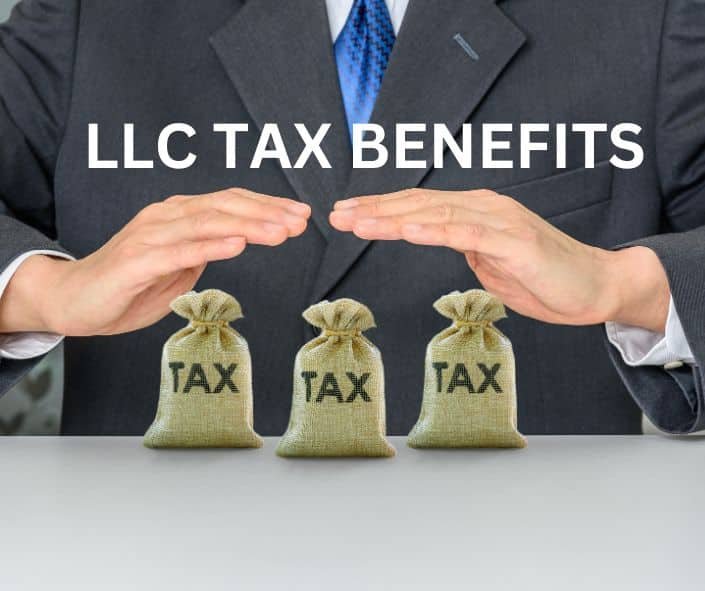When it comes to starting a business, one of the most crucial decisions you’ll face is choosing the right structure. While there are several options available—such as sole proprietorships, corporations, and partnerships—many entrepreneurs are increasingly turning to Limited Liability Companies (LLCs). Why? Because LLCs offer a unique set of tax advantages that can help you save money, reduce personal liability, and grow your business more efficiently. In this article, we will explore the various tax advantages for LLCs and how you can make the most of them in 2024.
Also Read: How Tax Treaties and Foreign Income Impact

What is an LLC?
A Limited Liability Company (LLC) is a business structure that combines the flexibility of a partnership with the liability protection of a corporation. It is one of the most popular choices for small businesses and startups due to its versatility and relatively simple administrative requirements. LLCs are distinct because they provide personal liability protection for owners (referred to as members), meaning members are not personally responsible for the company’s debts or legal obligations.
But the real draw for many entrepreneurs is the tax advantages for LLCs, which we’ll explore in depth.
How LLCs Benefit from Pass-Through Taxation
One of the primary tax advantages for LLCs is pass-through taxation. Unlike a traditional corporation, which is taxed separately from its owners, an LLC allows profits and losses to “pass through” to the individual members’ personal tax returns.
How Does Pass-Through Taxation Work?
Under pass-through taxation, LLCs avoid the issue of “double taxation” that corporations often face. Double taxation occurs when a corporation’s profits are taxed at the corporate level, and then any dividends distributed to shareholders are taxed again on their personal returns. With an LLC, profits are only taxed once—on the members’ personal tax returns.
For example, if an LLC makes $100,000 in profit, that income will be reported on the members’ personal tax returns, and they will pay taxes at their individual income tax rates. This allows LLC owners to avoid the double taxation that C corporations face.
Why is Pass-Through Taxation a Huge Advantage?
For many business owners, pass-through taxation is one of the most significant tax advantages for LLCs. This feature can significantly reduce the overall tax burden, particularly for small businesses and startups that are just getting off the ground. By avoiding the additional layer of corporate tax, LLCs can keep more of their profits to reinvest in the business or distribute among the members.
Flexibility in Tax Classification
LLCs are incredibly flexible when it comes to how they are taxed. Depending on your situation and preferences, you can choose the tax classification that best suits your business needs.
Default Tax Classification for LLCs
By default, a single-member LLC is treated as a sole proprietorship for tax purposes, and a multi-member LLC is treated as a partnership. This means that the LLC itself does not pay taxes on its income; instead, the income is passed through to the members who report it on their personal tax returns.
However, LLC owners can also opt to be taxed as an S-Corporation or C-Corporation by filing the appropriate forms with the IRS.
S-Corporation Election for LLCs
Electing to be taxed as an S-Corporation can offer additional tax advantages for LLCs. An S-Corporation allows LLC owners to split their income into two categories: salary and distributions. By paying themselves a reasonable salary (subject to payroll taxes), LLC owners can then take the remaining income as distributions, which are not subject to self-employment taxes.
This can result in significant savings, especially for LLCs with substantial profits. For example, if your LLC makes $200,000 in profit, you can pay yourself a salary of $100,000 and take the remaining $100,000 as a distribution. Only the salary portion is subject to payroll taxes, while the distribution is not.
Also Read: Understanding Global Tax Reporting Requirements

Deductible Business Expenses
Another major tax advantage for LLCs is the ability to deduct legitimate business expenses. LLCs can deduct a wide range of expenses from their taxable income, which can lower the amount of taxes owed.
What Expenses Are Deductible for LLCs?
Some common deductible expenses for LLCs include:
- Start-up Costs: LLCs can deduct up to $5,000 in start-up costs in the first year of operation, with the remainder amortized over 15 years.
- Operating Expenses: Day-to-day expenses like office rent, utilities, supplies, and salaries for employees are all deductible.
- Business Mileage: If you use your car for business purposes, you can deduct mileage, parking fees, and tolls.
- Equipment and Supplies: LLCs can deduct the cost of office equipment, computers, software, and other necessary business supplies.
- Travel and Meals: Business-related travel, including airfare, hotel, and meals, can be partially or fully deducted.
These deductions reduce the taxable income of the LLC, which in turn reduces the amount of taxes owed.
Self-Employment Tax Savings
Owners of LLCs are typically considered self-employed, meaning they are responsible for paying self-employment taxes, which cover Social Security and Medicare. However, LLCs offer opportunities for saving on self-employment taxes.
How LLCs Can Save on Self-Employment Taxes
By electing S-Corp status, LLC members can reduce their self-employment tax burden. As discussed earlier, LLC owners who elect S-Corp taxation can classify part of their income as distributions rather than salary. Distributions are not subject to self-employment taxes, so this can result in substantial savings, especially for LLCs with high profit margins.
For example, instead of paying self-employment tax on the entire $200,000 profit, an LLC owner can reduce the amount subject to self-employment tax by taking a portion of the income as a distribution, resulting in lower overall taxes.
Also Read: Understanding Inheritance Tax Laws 2024

Limited Liability Protection
While not directly related to taxes, one of the tax advantages for LLCs is the personal liability protection LLCs provide. Members of an LLC are generally not personally responsible for the debts or liabilities of the business. This is a significant advantage, especially when compared to sole proprietorships or partnerships, where personal assets are at risk in the event of a lawsuit or business failure.
Having limited liability protection doesn’t directly affect your tax obligations, but it can prevent financial ruin in the event of unforeseen legal or business issues, which in turn protects your personal income and savings.
Potential State Tax Advantages for LLCs
In addition to federal tax benefits, LLCs may also enjoy state-specific tax advantages, depending on the state in which they are formed and operate. Some states have no income tax, while others offer tax incentives to encourage businesses to establish an LLC in their jurisdiction.
Examples of State Tax Advantages
- Wyoming: Known for its business-friendly laws, Wyoming offers LLCs a low annual fee and no state income tax.
- Delaware: Delaware is famous for its favorable tax laws, which include no sales tax and low corporate income tax rates for LLCs.
- Nevada: Nevada does not impose state income tax on LLCs, making it an attractive option for businesses seeking to minimize their tax liability.
Frequently Asked Questions About Tax Advantages for LLCs
1. How does pass-through taxation benefit LLCs?
Pass-through taxation allows LLCs to avoid double taxation, as the profits are only taxed once on the members’ personal tax returns. This can reduce the overall tax burden for LLC owners.
2. Can LLCs elect S-Corp status for tax purposes?
Yes, LLCs can elect to be taxed as an S-Corp. This allows LLC owners to take part of their income as distributions, which are not subject to self-employment taxes, offering significant savings.
3. What types of business expenses can LLCs deduct?
LLCs can deduct a variety of business expenses, including start-up costs, operating expenses, office supplies, business mileage, travel, and meals, reducing taxable income and the amount of taxes owed.
4. Do LLCs pay self-employment taxes?
LLC members are generally considered self-employed and must pay self-employment taxes. However, electing S-Corp status can help reduce self-employment taxes by classifying part of the income as distributions.
5. Are LLCs eligible for state tax advantages?
Yes, some states offer specific tax advantages for LLCs, including no state income tax or favorable tax rates. States like Wyoming, Delaware, and Nevada are known for their business-friendly tax laws.
Conclusion
The tax advantages for LLCs are substantial and can make a big difference in how much you pay in taxes as a business owner. From pass-through taxation to self-employment tax savings, LLCs offer a flexible and tax-efficient way to operate a business. By carefully considering the tax benefits and taking advantage of available deductions and state-specific advantages, you can ensure that your LLC is both financially efficient and legally protected. If you’re thinking of starting a business, forming an LLC could be one of the best decisions you make in 2024.

2 thoughts on “Tax Advantages for LLCs: Why You Should Consider an LLC for Your Business”